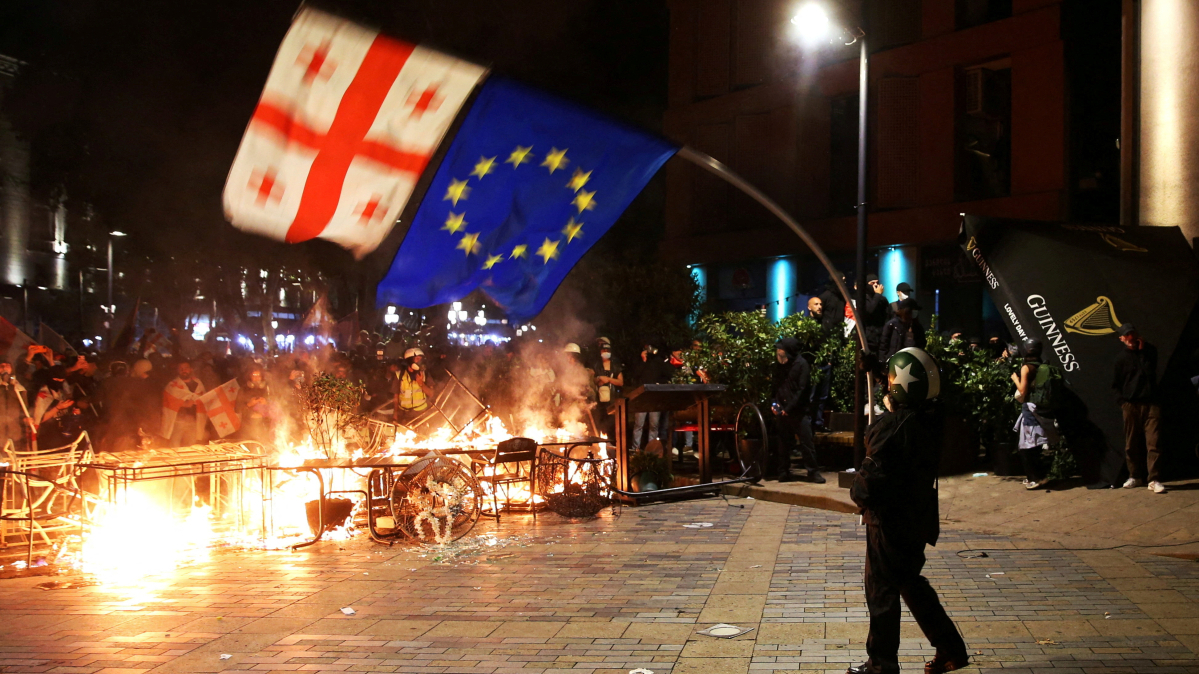Trump says additional talks with Iran expected on Friday
Tensions between the U.S. and Iran are escalating, with Washington ordering a significant military build-up in the region and multiple countries evacu...

Two major protest marches are set to take place in the capital this evening, marking one year since the political controversy surrounding Georgia’s stalled EU membership negotiations.
Citizens, educators, opposition members and civil society groups are preparing to gather near Parliament after separate marches from Tbilisi State University (TSU) and the old Public Broadcaster building.
Organisers say participants will begin marching at 19:00 local time, with both groups converging at 20:00 outside the Parliament building on Rustaveli Avenue.
The demonstrations come exactly one year after Prime Minister Irakli Kobakhidze announced that EU accession negotiations would not move forward until 2028, a decision that sparked daily protests lasting 365 days.
Professors and teachers from TSU have already publicly confirmed their participation, calling the day symbolically important for academic and civic unity. Representatives from various fields — including several opposition parties — are also expected to join.
Ahead of the rally, Former President Salome Zurabishvili called on citizens to take part. In a statement emphasising Georgia’s democratic direction, she wrote:
“Georgia will not be enslaved by Russia. The regime will not block our path to Europe. Our choice is unchangeable and firm… #GeorgiaWillWin.”
Zurabishvili framed November 28 as a moment to reinforce the country’s commitment to European integration, peace, and freedom.
Government officials strongly criticised the rally plans and denied responsibility for the stalled EU process.
Tbilisi Mayor Kakha Kaladze argued that protest organisers represent a “minority” who want to “rearrange things by force,” insisting that the government acts solely in the interest of “peace and sovereignty.”
Kaladze also reiterated the ruling party’s position that the EU had suspended negotiations months before Kobakhidze’s statement, and that Georgia is being pressured for refusing to open a “second front” against Russia or join sanctions.
“Whoever goes against the constitution will face an appropriate response,” the mayor warned.
Opposition parties, however, say the demonstrations highlight a continuing struggle for democracy.
Irakli Pavlenishvili, Deputy Secretary General of the United National Movement, called the year-long protest “unprecedented,” praising citizens who have “not broken down despite repression.”
He believes today’s turnout will be significant:
“The protest continues until victory—until Georgia’s choice between East and West becomes clear.”
Other opposition parties expressed differing views on cooperation. Giorgi Sharashidze of Gakharia for Georgia criticized the UNM for “damaging” the peaceful protest with irresponsible actions, arguing that stronger resistance to the government is possible from inside Parliament rather than through street rallies.
He called the government's decision on November 28, 2024, a “betrayal of the country’s interests,” but maintained that his party will not join rallies that risk being “discredited.”
A new report from Transparency International Georgia describes a difficult environment for journalists throughout the year-long protests. The organization documented around 400 cases of violence, intimidation, harassment, and interference with media work since November 2024.
Dozens of journalists covering protests reportedly required medical assistance after being injured during clashes or dispersals.
November 28 is important as it marks one year since Prime Minister Irakli Kobakhidze’s EU negotiations announcement.
The announcement triggered 365 consecutive days of protests with protesters demanding new parliamentary elections and release of detained demonstrators.
The ruling party denies halting the EU process and accuses both protest leaders and some European officials of political manipulation.
As two marches converge tonight, November 28 has become more than an anniversary — it has become a test of public unity, political accountability, and Georgia’s contested path toward Europe.
Authorities say the government will ensure order with opposition groups saying the protest movement will continue while civil society warns that the situation remains fragile.
Tensions between the U.S. and Iran are escalating, with Washington ordering a significant military build-up in the region and multiple countries evacuating diplomatic staff amid fears of further instability.
The situation in Cuba was heating up and called for restraint following a deadly incident involving a Florida-registered speedboat off the coast of the Caribbean island, the Kremlin said on Thursday (26 February).
Another shipment of petroleum products from Azerbaijan to Armenia has been dispatched, with 39 rail tank cars carrying 4,500 tonnes of diesel fuel sent today, Report informs.
Russian President Vladimir Putin’s special envoy, Kirill Dmitriev, arrived in Geneva and may hold talks with U.S. officials, according to the RIA news agency.
Pakistani air strikes hit a weapons depot on the western outskirts of Kabul overnight, triggering hours of secondary explosions that rattled homes across the Afghan capital and left residents fearing further violence.
Abdullah Öcalan, the jailed leader of the outlawed Kurdistan Workers’ Party (PKK), issued a statement on Friday (27 February) calling on Ankara to adopt legislation aimed at promoting political inclusion.
Pakistani air strikes hit a weapons depot on the western outskirts of Kabul overnight, triggering hours of secondary explosions that rattled homes across the Afghan capital and left residents fearing further violence.
Pakistan’s declaration of an “open war” with Afghanistan must be understood in the context of months of escalating violence, regional analysts have said, describing the latest developments as a significant shift in the nature of the conflict.
Israeli strikes killed five people in Gaza on Thursday (26 February), according to health officials in the territory. The Israeli military said separately that it had killed a militant who posed an imminent threat to its forces in southern Gaza.
Iran’s Foreign Minister Abbas Araghchi on Friday urged Afghanistan and Pakistan to resolve their differences through dialogue, offering Tehran’s assistance to facilitate understanding between its eastern neighbours.
You can download the AnewZ application from Play Store and the App Store.

What is your opinion on this topic?
Leave the first comment